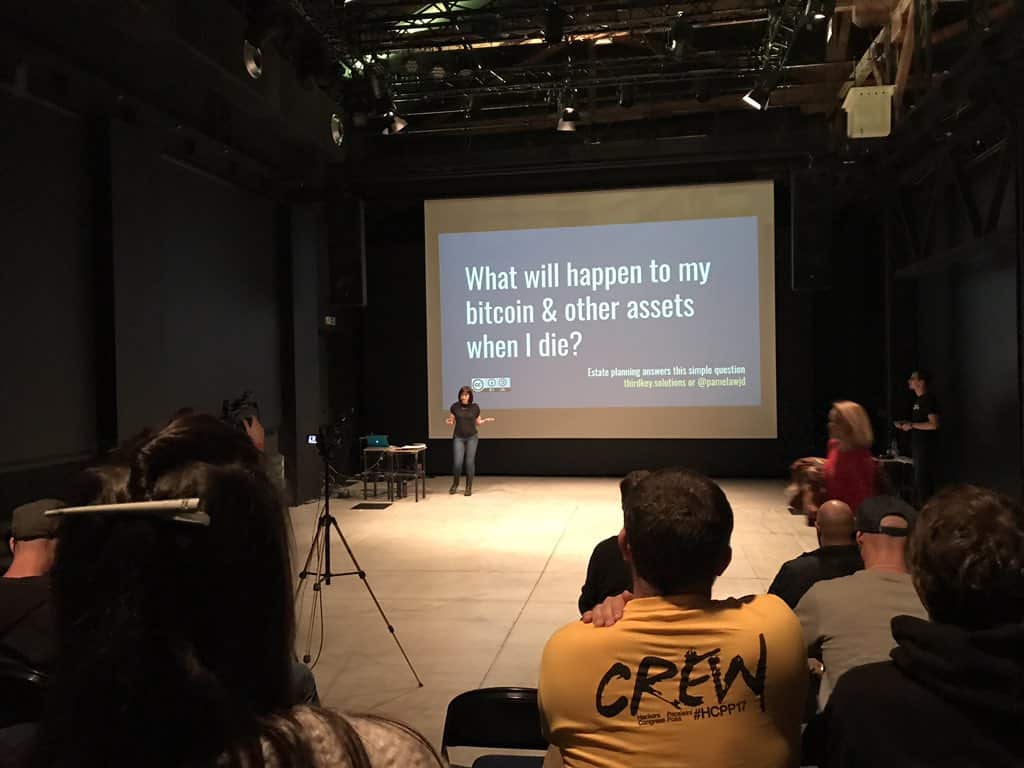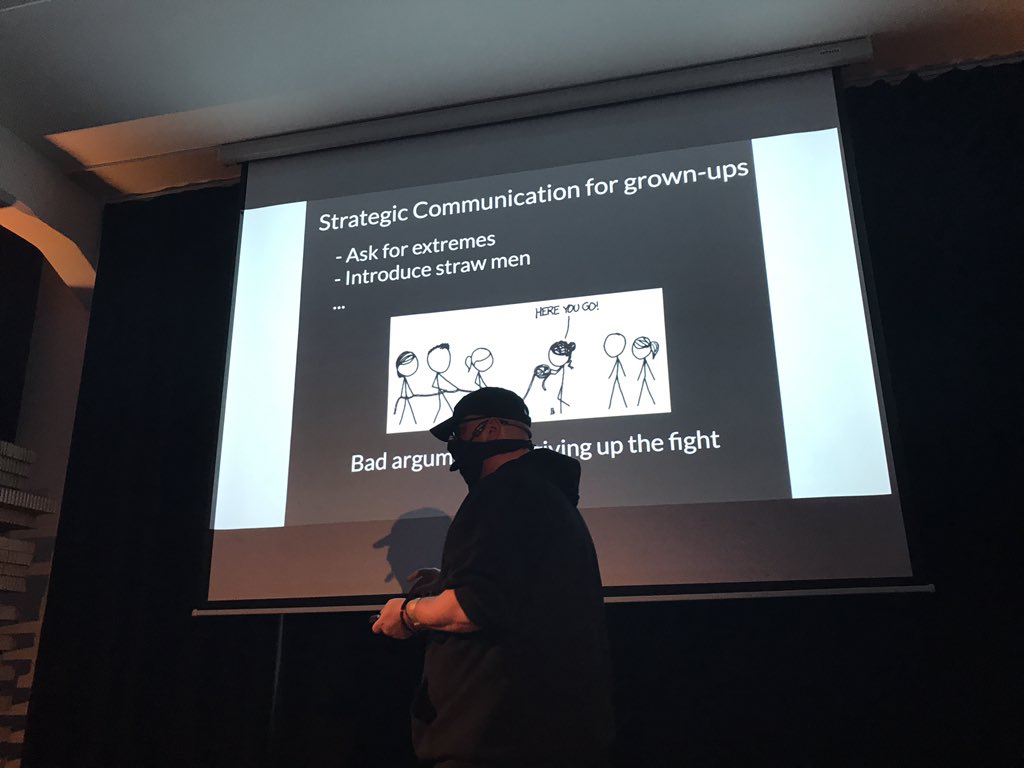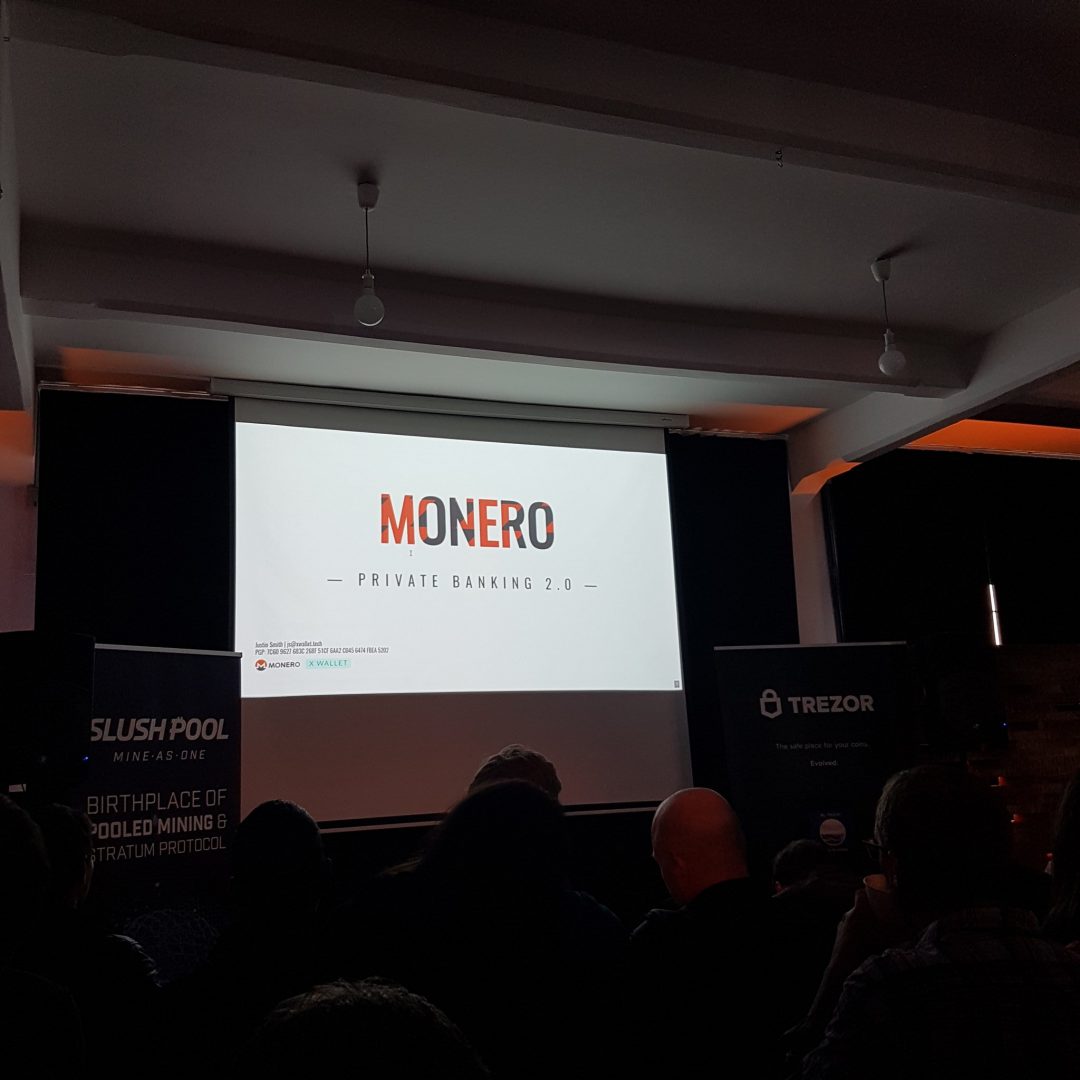Hacker’s Congress at Paralelní Polis: Highlights from the Three-day Event

The Hacker’s Congress took place over October 6-8 at Prague’s Paralelní Polis, a hub for Cryptocurrency, Technology and Cryptoanarchy. Here we provide some of the highlights from the three-day event, reviewing three talks from each day as well as links to videos.
Day 1
Foundations of Internet Money
One of the first talks was Zcash’s Paige Peterson who explained the recent efforts of the team to reduce the memory requirements and proving time of zk-SNARKs is part of a wider goal to improve the cryptography and achieve the goal of a fully fungible, private cryptocurrency. At the moment, shielded transactions are “not that feasible” and are inefficient. Peterson went on to say that “one day, we hope to get rid of transparent addresses,” and shouted out Monero which she explained has the same goal as Zcash but approaches it with a different method.
The Sapling release, which improves the speed and efficiency of zk-SNARKs, is expected to be ready for use in 2018. The anonymity set will be much larger consequently. However, at the present time, transparent transactions are dominant and one day, the Zcash team hopes to have predominantly shielded transactions. Trezor is also anticipated to add z-addresses once Sapling is released.
Another feature presented was ‘payment offloading,’ which addresses the resource-intensive nature of Zcash transactions. With this feature, you will be able to offload the zero-knowledge computations to a third-party server so you can send the data needed to generate the zero-knowledge proof to computers that have the required resources. However, this is another trusted setup which Zcash has been criticized for in the past, but could be vital for further adoption by opening the technology to a wider audience. While the third-party server cannot spend your transaction with payment offloading, they can view the transactions.
The topic of trusted setup also came up and peterson explained that any other methods to use zero-knowledge proofs are highly inefficient, such as STARKS. A paper will soon be released improving the situation with the trusted setup, which may address the concerns mentioned previously.
Peterson also examined internet money for the social good, pointing to the need for cryptocurrencies like Zcash in light of cases like Barrett Brown, who was put in jail for sharing a link. The FBI basically wanted to learn who Brown’s supporters were, asking for all information on identities of donors. Zcash has been adopted by the management of Brown’s legal funds, providing much needed privacy in politically sensitive cases. Internet money for enterprises and governrnent was also touched upon, where privacy-focussed cryptocurrencies have beneficial use cases in supply chain, large transactions for banks, and view keys can be utilized for tax purposes.
Cryptocurrencies Will Live Forever: You Won’t
Entrepreneur and attorney Pamela Morgan presented on the topic of leaving cryptocurrency as an inheritance and how to prepare for your eventual death. Many people prefer to not think of their mortality, but if you hold cryptoassets, you must plan for the future. Without a plan the law will dictate what happens while at the same time, your keys can be lost forever.
While there may be some projects building a software solution to estate planning problems, the technology as it stands is immature. Morgan’s talk identified three ways you can start planning:
- Give a gift; leave your mark on this world altruistically,
- A Security Makeover; Identify all cryptoassets, backups and update overall security,
- Time Machine Mission; leave a secret cache that your loved ones will stumble upon and send them on an adventure to recover your private keys.
A more detailed guide can be found here, along with the slides from Morgan’s presentation.
The Fog of Crypto War
Smuggler presented a talk on aspects of crypto-politics and activism related to the recent debate about banning encryption in many countries, most notably with the former UK prime minister David Cameron stating he wants ‘no safe spaces for terrorists’ as a raison d’être. The same thing happened in the 1990’s and Smuggler outlined some responses for the crypto-anarchist community.
One of the mistakes pro-crypto activists often make is that they think in binary terms, according to Smuggler:
“It’s either 100 percent secure or unsecure. Security is a gradient, we don’t have 100 percent secure systems, we might not have an 100 percent insecure systems. Security is a tradeoff you can argue about. If security is binary, you are giving up that discussion.”
With regards to regulation, it is enforced to keep people from using secure technology, and works by ‘nudging’ the majority:
“Standard regulation approaches are expensive and unlikely, went through in the 90’s and we and politicians know they don’t work.”
In the debate about privacy and encryption, the crypto-anarchist community needs to actively engage with the politicians and the general public to include aspects like vendor neutrality, the freedom and integrity of processing devices and the right to digital self-defense. Should we be able to force vendors to cooperate with the police ever? Do users have the right to control what software runs on their devices? Do they have the freedom to install, remove, and develop whatever software they see fit? Do users actually own – and control – their devices? Do users have the right to control what software runs on their devices? Do they have the freedom to install, remove, and develop whatever software they see fit?
These are questions we need to be thinking about and including in this debate.

He stated it is not unrealistic or unlikely that the government is trying to get to our updaters, which have the permission to change all software on the system. For example, Apple and Google have been known to manipulated their app stores, Catalonian voting software was removed by a single court order, so we have to take software out of the apps store.
Today, more than 90 percent of all crypto software is delivered through app stores. The advice?; find out how to build updaters and deploy the that are immune against government and so that every user of the user can verify every other user is using the same system/binary.
The content the presentation is based on can be found here.
When asked about privacy for the average user, Smuggler responded, “Tor is great for hidden services not great for surfing the Clearnet. Better idea to use VPN service for Clearnet. I would actually defend my rights by using my rights. Encrypt the shit out of everything, use PGP, Signal, https everywhere, open source operating systems, smartphone (give up on iOS and Android shit), invest in the Purism open-source smartphone project.”
Responding to the possibility of a ban on cryptocurrency:
“A ban would reduce the value of crypto, it is realistic to enforce. If they really wanted to get them out of the net, they could get them out, easily detectable, not that hard to e.g. bootstrapping of cryptocurrency, find out the first nodes, shut that down, start collecting node information… If they want to do it, I’m not sure, but is possible.”
Video 1
Another very popular talk from the first day was from Amir Taaki, which can be found here.
Day 2
Lightning Networks and Layer 3
Julien Guitton, contributor to Bitcoin, lightning network and bitmessage, talked about the much-anticipated scaling solution. What was very interesting about his talk was the focus on Lapps, or Lightning Network Apps. Guitton identified three in particular; peer-to-peer exchange, pay per content, and DAOs. He introduced the audience to Enigma’s whitepaper, which explains how traders will be able to use the Lightning Network to trade with leverage. Payment per page view will also be easily achieved with lightning. Regarding DAOs, they may emerge in the future and begin to do ICOs, with shares available over the p2p network.
“In essence, Lightning is all about topology, so it is uncertain how it will look exactly.”
Anonymous Insurance and Prediction Markets
Cryptoanarchist and CEO of Nethemba, Pavol Lupták, presented a thought experiment on how cryptocurrencies could be used to provide anonymous insurance and prediction markets.
Anonymous insurance and predictions markets could utilize cryptocurrencies like monero and zcash, along with Tor/I2P. Lupták pointed to two effects of anonymous markets:
“Firstly, they introduce something that was not possible in the past and thanks to truly anonymous cryptocurrencies and prediction markets, is technically feasible now – the creation of fully anonymous economic incentive.
Secondly, Thanks to this property, the prediction markets allow democratization of corporatism. Anyone can make an anonymous incentive to corrupt the politicians. Technically this can be achieved by prediction markets.”
The slides to the presentation can be found here.
The Future of Swiss Private Banking – Monero
Justin Smith, CEO of XMR systems, started his talk with an anecdote of how he get into cryptocurrency. Smith’s journey into the scene started with a realization of the soft power banks have over us and which is often wielded as a weapon. After the bank froze his account and requested that he provide his residential address rather than a mailbox address, he decided to start using cash instead. It was this experience that made him realize financial sovereignty is really important and that’s what drew him to Bitcoin.
However, privacy in bitcoin is a fragile thing, as at some point, you willingly or unwillingly give up your identity, whether it be through airdrops, exchange verifications of Bitcoin ATMs. Smith sees this as dangerous. It leaves the door open to the possibility that since every bitcoin transaction is traceable, at some point, authorities might ask about everything you’ve ever done.
Consequently, Smith looked for a privacy solution and was not satisfied with the offering of Darkcoin and Blackcoin at the time. But then in early 2017, his friend suggested monero and Justin was very happy with it once he researched it, especially relating to the inflation bug that was fixed in the CryptoNote protocol. While he stated there are some technical concerns, this is true of everything.
Monero augments financial sovereignty by providing a layer of privacy and Smith pointed to the value of privacy, as Swiss banks accounts provide. But this comes at a high cost and not everyone can afford such a luxury. Nevertheless, this system is not perfect either for retaining privacy, as humans are still in control and Smith thinks that monero is the technology to solve that problem.
While banks today are a constraint on the productive sector of society, Smith envisions that banks of the future will be part of a ‘value-added industry.’ He reckons that banks of the future will start to audit wallet codes, provide backup/restoration services, train for security and provide identity notary services. Also, Smith sees a development where banks will being to work with clients with monero, since it is easy to reveal your identity/relationship with bitcoin.

Providing the example of walking down a sketchy street in Chicago and keeping your focus immediately in front of you, if there is a crime, you cannot testify as you did not see what happened. Similarly, with monero, banks and others will have no idea what their clients have been doing or who they have transacted with. For this reason, Smith explains that is why he like Monero, since it is like ‘cash in the mail,’ but you can prove you sent it and you can restore it.
But when will this shift in banking occur? Smith stated, “I think it’s happening now.” He explained that companies do not profit from tracking their customers, applying KYC/AML policies, but rather burdens them with an additional cost. Once we have a consumer grade mobile device for monero and cryptocurrency in general, the banking system will change.
Only the wealthy have access to Swiss Private banking and the Xwallet for iOS hopes to change that by providing a Monero wallet for the masses, reaching more than 1 billion people. While there was expectation of a wallet demonstration, Smith explained there had been a change in focus; instead of just dumping Xwallet into the Apple Store, the focus now is on building a company to bring this commercial-grade application and taking a long-term view. It was stressed that Xwallet is not a retail payment solution but rather a tool to democratize private Swiss banking. Once the wallet is on the Apple store, the source code will be released.
Video 2
Blockstream’s Adam Back gave a talk on ‘Privacy, Fungibility, and Scale in Bitcoin’ and his presentation can be viewed here.
Day 3
Storing Value in Cryptocurrencies without Fortune Telling
Hacker and entrepreneur Juraj Bednár delivered a talk on how to store value in cryptocurrency. He touched on two strategies; discount on capital and buying a little bit of cryptocurrency at regular intervals.
For instance, suppose once you buy bitcoin or any other cryptoasset, you can set a certain percentage as your exit point, say 30 percent. Once your holdings have appreciated by 30 percent, you can use this surplus to exchange for fiat and get an effective discount on what it is you need to buy.
Juraj Bednár also revealed his portfolio composition; 25 percent monero and 75 percent bitcoin, although he did state he has trace amounts of ETH, LTC, and ZEC (to experiment with these technologies). Also, it was recommended for crypto-investors to diversify into gold. The hacker also believes it will be hard for new cryptocurrencies to build a network effect as strong as Bitcoin’s and referred to the ‘Lindy effect,’ which demonstrates non-perishable things will rise in value with age, a reason why the network effect is so important.

Welcome to the Recentralized World
Maksim Izmaylov presented an interesting speech of a little talked about force in the world of blockchain; recentralization. The whole point of distributed computing is to have networks that are not controlled by one, or a few, companies or individuals. However, from Izmaylov’s experience in the blockchain world with WindingTree, a decentralized travel solution, he shared his concerns with the audience.
For instance, he gave anecdotal evidence of this trend of recentralization. One example was that with a call of one of the Ethereum co-founders, he was told, “Max we have built up a lot of resources, we want to help you.” They offered him a lot of support, but he had to give up 50 percent of the WindingTree tokens. Izmaylov declined, but he revealed that he knows that at least one project took such a deal.
Moreover, he pointed to Augur, saying that the founding team owns 50 percent of the tokens – which is arguably, not decentralized. In a similar vein, Filecoin is criticized for accepting only accredited investors. While Izmaylov complimented the technology behind it, he says this is another example of recentralization, as Filecoin is owned by a small number of investors from the US. He asked:
“Is that the future we want? Is that what we are fighting for?”
ICOs were also touched upon, about how Silicon Valley is ‘shitting their pants’ as it brings more competition and how the little guys who have been shut out can now invest directly in startups and new technologies. Of course, he stated most are scams, stressing the need to ‘take the power back’ and ‘taking responsibility to inform yourself.’
Liberland State Model for the 21st Century
Liberland’s President Vít Jedlička attended HCPP17 and gave the audience an update on how the libertarian country is getting on. The talk also touched upon a recent assessment of Liberland’s claim to statehood and its implications from the Chicago Journal of International Law.
Jedlička revealed Liberland is experiencing a lot of interest from business, almost 70,000 which is higher than that of Liechtenstein, another small country in Europe. It is a well-defined territory sitting between Croatia and Serbia, where the former has never mentioned its claim to the land in question. The President also told the audience that new territories are being sought out, such as on in the Caribbean which lies in a special economic zone.
The judiciary system of the newly forced country was explained and there will be no ‘Ministry of Justice.’ Instead, ‘the Justice protocol’ based on Ethereum, Kleros will be used as a decentralized solution for judicial decisions. AirLiberland was mentioned as a way to travel in and out of the country, while Propy will be used for property registration.
Not only is Liberland pushing decentralization forward it its own territory, but has also signed a Memorandum of Understanding with Somaliland, another unrecognized country with 35 million people. Vít Jedlička said that a deal was made in which the state will implement decentralized technologies.
Interested in getting to Liberland? Well, the President shared a funny story; if there are only a few people, the Croatian police will try to prevent an attempt to enter Liberland, however, if there is a group of 30 or so people, the police back off. The libertarian country even has jetskis which outmanoeuvre Croatian boats on the Danube, which the audience found comedic.
Other key takeaways were that only $350,000 has been spent on this endeavour, the country will maintain friendly relations with Croatia, as it protects Liberland from any sort of invasion or occupation and there are 450 regular citizens at present. One of the most appealing aspects of Liberland is voluntary taxation, in which you get a share of the country in return, voting power and collateral for the actions you take in the country.
https://twitter.com/CynicLibertaria/status/917027759850967045
Video 3
Peter Todd presented ‘What does Blockchain Actually Do?’ and can be seen here.
Summary
With insights into various fields, HCPP17 is one of the best events to attend, if not the best event, to learn more about cryptocurrency and cryptoanarchy, with 2017’s talks focusing on what we can do to retake our financial sovereignty and privacy.
The event also handed attendees litecoin contactless cards, since the venue does not accept Czech Krown. A variety of merchandise was available too, such as t-shirts, Ross Ulbricht silver coins with bitcoin private keys and much more.
Limited edition of Ross Ulbricht / Bitcoin / Institute of Cryptoanarchy silver coins are ready for sale for 3000 CZK in crypto in Slévárna! pic.twitter.com/Yf9BGx3u8B
— Pavol Lupták (@wilderko) October 7, 2017
Even if you get bored of bitcoin or cryptocurrency, there were some pretty interesting speakers and talks related to anarchism and technology, such as Alexa Martinez’s talks on relationships and sex, two sessions on biohacking, and parties were also held at the end of each day. The author highly recommends attending HCPP18.

A special thanks to @mindstatex and @vemundzo for being my photographers.













